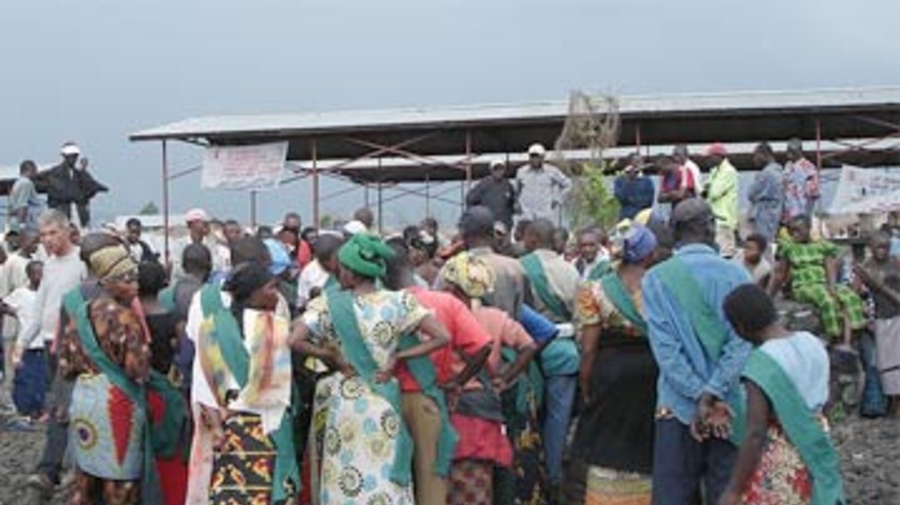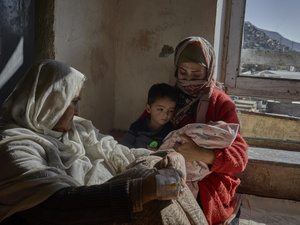UNHCR and partners battle cholera in North Kivu camps
UNHCR and partners battle cholera in North Kivu camps

A colourful crowd gathers for a distribution in Mugunga.
KINSHASA, Democratic Republic of the Congo, November 12 (UNHCR) - The UN refugee agency and its partners have stepped up joint efforts to curb the spread of cholera in camps hosting some 45,000 internally displaced Congolese in the troubled province of North Kivu.
The potentially fatal diarrhoeal disease broke out in early October in five camps for internally displaced people (IDPs) located in the Mugunga area of North Kivu, which is located in the east of the Democratic Republic of the Congo.
Latest reports from the camps indicate that the cholera situation appears to be stabilizing, with the number of new suspected cases dropping slowly but steadily.
Health workers said that at the end of October there were 439 suspected cases of cholera - 189 of them reported from October 24-28.
In last four days of October, 103 new cases were recorded, or about 25 per day, while in the first eight days of November medical personnel registered 135 new cases - an average of 16 a day.
"Last week we stepped up our aid efforts in the IDP camps close to Goma [the main town of the area, located not far east of Mugunga], in partnership with UN sister agencies and NGOs," UNHCR Representative Eusebe Hounsokou said. "The upsurge of cholera is only one of the many symptoms of the worsening humanitarian tragedy in North Kivu," he added.
Recent fighting in North Kivu between government forces, renegade troops and rebels has led to the worst internal displacement in the area since the end of the civil war in 2004. Some 375,000 Congolese have been forced to leave their homes in the province since last December, including more than 160,000 in the last two months alone.
Last week UNHCR and a non-governmental partner, ASODE, distributed soap to nearly 20,000 IDPs in two Mugunga camps - Mugunga I and II. The UN refugee agency hopes these efforts, together with improved water supply and sanitation as well as an intensive public awareness campaign on hygiene, will contain the spread of cholera in the camps.
However, there are fears that the poor living conditions at Lac Vert - a nearby makeshift site hosting more than 10,000 IDPs - could contribute to the further spread of cholera.
On Wednesday, UNHCR began the transfer of IDPs from Lac Vert to Buhimba, a new camp which the agency set up more than three weeks ago. The transfer is scheduled to be completed over the next 12 days. The UNHCR-built Buhimba camp, with capacity for more than 10,000 people, has the necessary basic health, water and sanitation facilities.
Following an evaluation of needs in the five UNHCR-managed IDP camps in the Mugunga area, the refugee agency also began this week to distribute plastic sheeting to 12,800 displaced people in Mugunga I and II.
With sharpening inter-ethnic divides and a continuous build-up of military forces, UNHCR remains deeply concerned about the risks of severe human rights abuses and violence against civilians. It welcomes all efforts to find a negotiated solution to the continuing confrontations and to prevent further the suffering of the North Kivu population brought on by prolonged instability and fighting.
By Jens Hesemann in Kinshasa, Democratic Republic of the Congo









